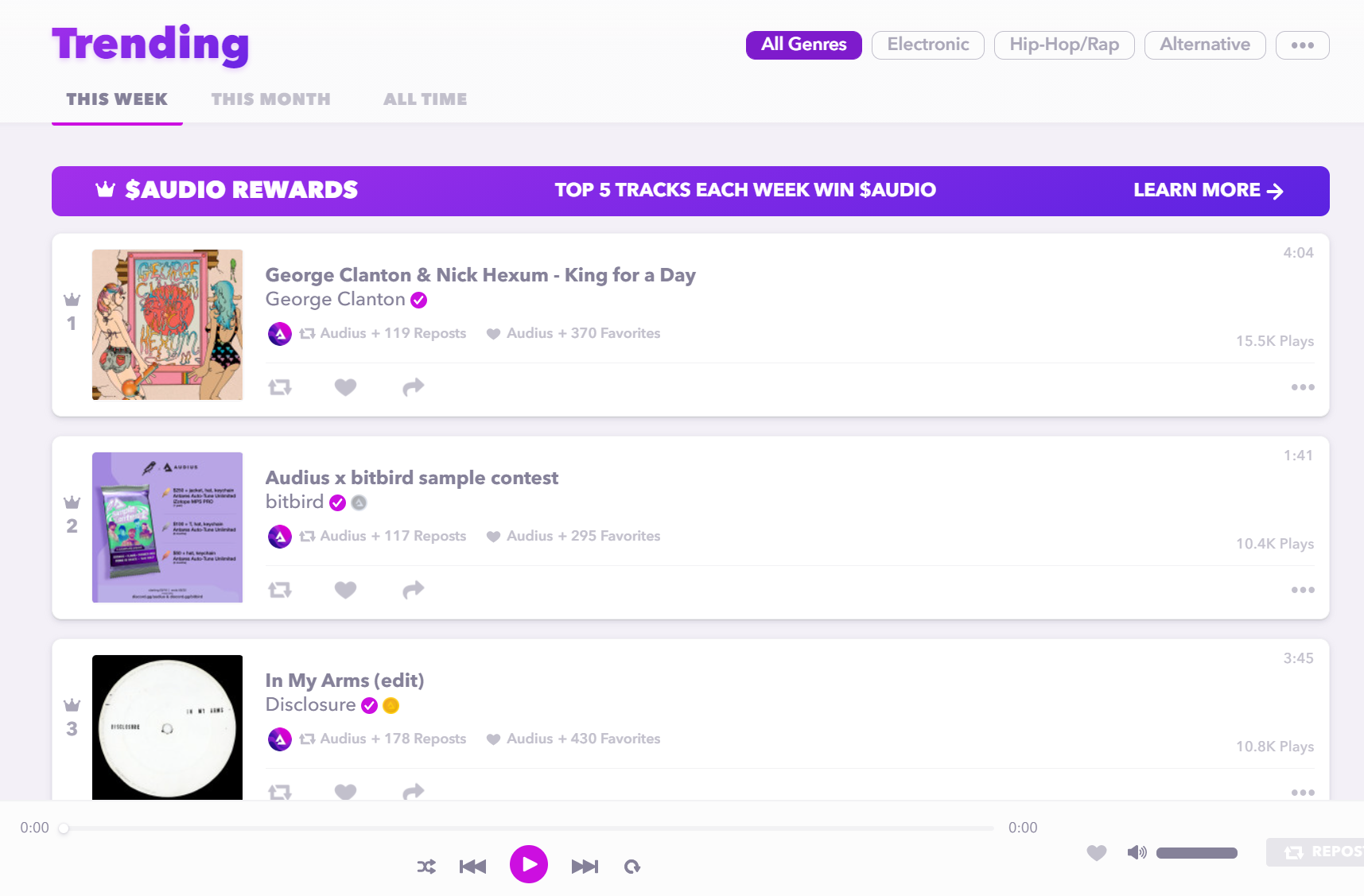On August 17, Tik Tok announced a partnership with Audius, a decentralized streaming music platform. Perhaps, Audius will thus become the blockchain application with the largest user base.
To sum it up, Audius allows artists to upload songs to Tik Tok's Sound Kit section with one click, but why not Spotify or Apple Music? Aside from the interest disputes between the giants, the decentralizedsecondary title
How is Audius better than the centralized original music platform?
Audius CEO Ranidu is a musician. For 15 years, he has been exploring creator economic platforms. These platforms have come and gone to change the rules, but they have always lacked a fairer economic model for artists.
Audius is a community-driven, artist-led music sharing protocol, similar to a decentralized version of SoundCloud, designed to help artists own, distribute and monetize their original works on the chain. The philosophy of Audius is to remove the middleman and directly connect artists and fans.
Audius has made three key improvements on the basis of the existing music platform:
1. More stable
Internet giants like Myspace, Youtube, SoundCloud, and centralized storage platforms have the power to change the rules for creators many times, so artists lose followers, sources of income, and creative motivation. Based on the commitment of community ownership and the trust endorsement provided by the blockchain, Audius will not frequently change the rules for its own revenue, regardless of whether the company operating the platform is financially healthy or not.
2. Artist-led
In Audius, artists have the right to vote to modify the Audius agreement, including issues such as content distribution and content monetization. This creates a level playing field for artists that is owned by the community and maximizes the benefits for creators.
3. Transparent and fast payment
secondary title
The number of users is growing rapidly, and capacity expansion is imminent
image description

Audius transaction interface
Such growth obviously puts higher demands on Audius clients. Compared with Ethereum itself, the POA network adopted by Audius has higher throughput and lower latency. However, because the network usage rate reached an all-time high, occupying 90-95% of the POA network space, after trying more than 20 Layer1 and Layer2 solutions, Audius finally chose Solana. There are two main reasons: one is cheap, the service fee cost of Solana is 1/100,000 of POA; the other is fast, the Solana block generation time is about 400 milliseconds, and the confirmation time is usually less than 1 second.
secondary title
Questions from Capital and Audius' Self-Insistence
Initially, Audius encountered these challenges on the road to financing:
1. There are no real customer problems to solve
In some respects, blockchain applications are censorship-resistant and represent "open protocols", and they don't talk about the ultimate interests of customers.
In this regard, Audius’ explanation is: Although there is resistance from censorship, it may also be disintermediation or re-intermediation, and there must be something in the middle of the value chain.
2. Capital-intensive markets lead to bad behavior
When the market is hot, a lot of speculators come in, like during the ICO heyday.
In this regard, Audius believes that: many such fraud cases have been reported by the media, which has created a negative impression on people, but really meaningful things will always happen.
3. There is actually no need for a blockchain
If you drop the word "blockchain" and replace it with "database," the argument becomes less appealing. In most cases, the centralized world will also have a fault-tolerant mechanism. What can investors gain from decentralization?
In this regard, Audius said: databases and artificial intelligence are technologies and tools, rather than independent solutions. This cannot be compared with the blockchain.
Looking back at Audius' explanation back then, it may not be a firm foothold, but Audius still relies on firm belief to move forward and has won the favor of capital. In August 2018, Audius received $5.5 million in Series A financing from top Silicon Valley investors such as General Catalyst, Lightspeed, Pantera Capital, Kleiner Perkins, 122 West, and Ascolta Venture. In July 2020, Audius received another US$3.1 million in financing, led by Multicoin Capital and Blockchange Ventures. In October 2020, Binance made a strategic investment of US$1.25 million in Audius. After cooperating with Tik Tok, the market value of Audius officially exceeded 1 billion US dollars.
Looking at the industry, the exploration of the creator economy by blockchain technology is already in deep water. A typical example is BM: From Steemit to Voice to Clarion in 2016, BM has been sticking to the social sector and the incentive model of text content creation, and hopes to create a powerful and independent ecological application. In contrast, Audius can join hands with Tik Tok from the traditional Internet field, which not only subverts the music content creation sector, but also amplifies the value of the underlying public chain Solana.